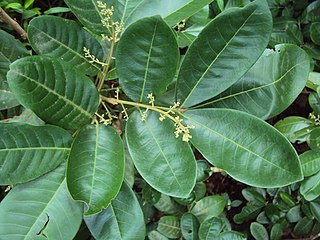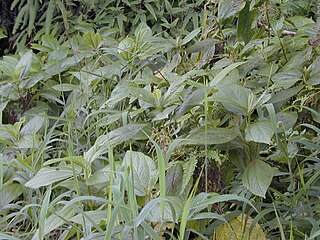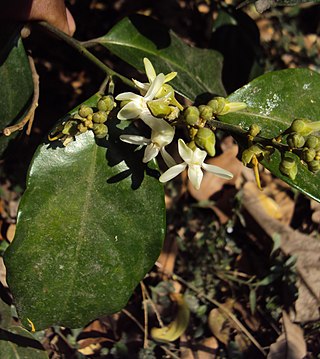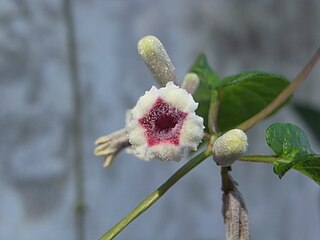
Aralia, or spikenard, is a genus of the family Araliaceae, consisting of 68 accepted species of deciduous or evergreen trees, shrubs, and rhizomatous herbaceous perennials. The genus is native to Asia and the Americas, with most species occurring in mountain woodlands. Aralia plants vary in size, with some herbaceous species only reaching 50 centimetres (20 in) tall, while some are trees growing to 20 metres (66 ft) tall.

Allocasuarina, commonly known as sheoak or she-oak, is a genus of flowering plants in the family Casuarinaceae and is endemic to Australia. Plants in the genus Allocasuarina are trees or shrubs with soft, pendulous, green branchlets, the leaves reduced to scale-like teeth. Allocasuarinas are either monoecious or dioecious, the flowers never bisexual. Male and female flowers are arranged in spikes, the female spikes developing into cone-like structures enclosing winged seeds.

Aglaia is a genus of 121 recognised species of woody dioecious trees in the mahogany family Meliaceae. They occur in the subtropical and tropical forests of Southeast Asia, northern Australia and the Pacific.

Casuarina, also known as she-oak, Australian pine and native pine, is a genus of flowering plants in the family Casuarinaceae, and is native to Australia, the Indian subcontinent, Southeast Asia, islands of the western Pacific Ocean, and eastern Africa.

Boehmeria is a genus of 47 species of flowering plants in the nettle family Urticaceae. Of the species, 33 are indigenous to the Old World and 14 to the New World; no species is indigenous to both the Old and New Worlds. The species include herbaceous perennials, shrubs and small trees. Although related to the similar-looking species of the stinging nettles of genus Urtica, species of Boehmeria do not have stinging hairs. Because of the similarity in appearance, some species are commonly called "false nettles".

Friedrich Anton Wilhelm Miquel was a Dutch botanist, whose main focus of study was on the flora of the Dutch East Indies.

Schefflera is a genus of flowering plants in the family Araliaceae with 13 species native to New Zealand and some Pacific islands.

Dysoxylum is a genus of rainforest trees and shrubs in the flowering plant family Meliaceae. About 34 species are recognised in the genus, distributed from India and southern China, through southeast Asia to New Guinea, Solomon Islands, and Australia. The name Dysoxylum derives from the Greek word ‘Dys’ meaning "bad" referring to "ill-smelling" and ‘Xylon’ meaning "wood".

Trigoniaceae is a family of flowering plants, consisting of 28 species in five genera. It is a tropical family found in Madagascar, Southeast Asia, Central and South America.

Tetrastigma is a genus of plants in the grape family, Vitaceae. The plants are lianas that climb with tendrils and have palmately compound leaves. Plants are dioecious, with separate male and female plants; female flowers are characterized by their four-lobed stigmas. The species are found in subtropical and tropical regions of Asia, Malaysia, and Australia, where they grow in primary rainforest, gallery forest and monsoon forest and moister woodland. Species of this genus are notable as being the sole hosts of parasitic plants in the family Rafflesiaceae, one of which, Rafflesia arnoldii, produces the largest single flower in the world. Tetrastigma is the donor species for horizontal gene transfer to Sapria and Rafflesia due to multiple gene theft events.

Aphanamixis is a genus of plants in the family Meliaceae, native to Asia.

Buchanania is a genus of plants in the mango and cashew family Anacardiaceae, native to areas from India to southern China, and southwards to northern Australia and the western Pacific.

Pseuduvaria is a genus of the plant family Annonaceae and tribe Miliuseae: with a native range is Tropical Asia.

Xanthophyllum is a genus of about 109 species of trees and shrubs, of the plant family Polygalaceae;. The generic name is from the Greek meaning "yellow leaf", referring to how the leaves are often yellow when dry. In Borneo it is known as minyak berok in Malay or nyalin in the Iban language.

Tetracera is a genus of flowering plants of the Dilleniaceae family native to the tropics. Several species are lianas.

Paederieae is a tribe of flowering plants in the family Rubiaceae and contains 81 species in 4 genera. Its representatives are found in the tropics and subtropics.

The Malmeoideae are a subfamily of trees and other plants of the family Annonaceae.
Voyriella is a genus of flowering plants belonging to the family Gentianaceae.
Dendrotrophe is a genus of flowering plants belonging to the family Santalaceae.

Oreocnide is a genus of flowering plants belonging to the family Urticaceae.


















